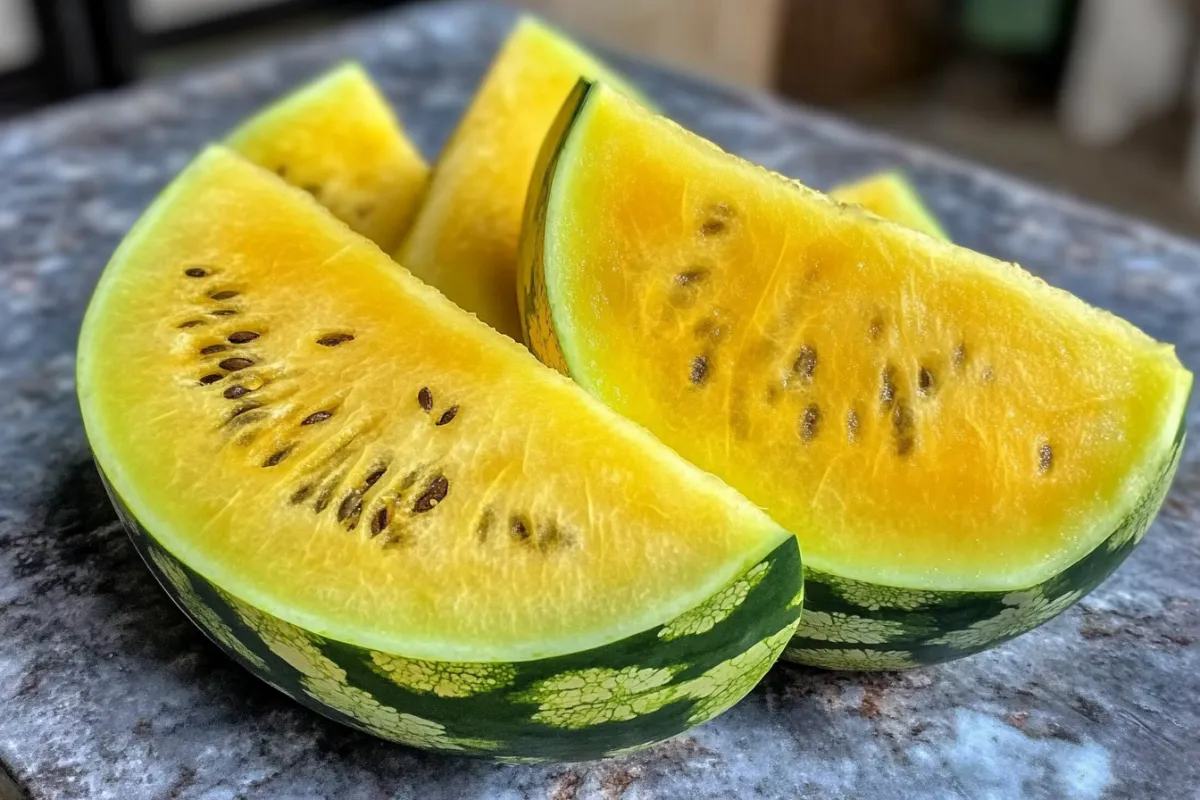Is the Yellow Watermelon Natural? A Comprehensive Guide
Yellow watermelon is a captivating and lesser-known variety of watermelon that surprises many with its vibrant, golden-yellow flesh. While most of us are accustomed to the familiar red or pink interior, slicing open a yellow watermelon brings a unique twist to the dining experience. But this raises an important question: Is yellow watermelon natural, or is it the result of human intervention, like genetic modification? In this article, we will dive deep into this topic, covering the origins, health benefits, and common misconceptions surrounding yellow watermelon. Plus, we’ll provide detailed growing tips and answer frequently asked questions.
What is Yellow Watermelon?
Yellow watermelon (Citrullus lanatus) belongs to the same species as the traditional red watermelon. The primary distinction lies in the fruit’s interior flesh color, which is bright yellow instead of red. This coloration is the result of a natural variation in the plant’s genetic makeup. The flavor profile of yellow watermelon is typically sweeter than red watermelon, often described as having a honey-like quality.
Origin and History
Watermelons originated in Africa thousands of years ago, with early varieties ranging in color from white to yellow to red. It wasn’t until farmers began selectively breeding watermelons for specific traits—like sweetness and flesh color—that the red variety became dominant in markets. However, yellow watermelons have continued to grow naturally in certain regions and remain a favorite among enthusiasts of unique fruits.
Yellow watermelon is grown in the same way as red watermelon, with no need for special modifications. It’s important to note that the yellow flesh results from the absence of lycopene, the compound responsible for red pigmentation in fruits and vegetables.
Internal Link Opportunity: For those interested in learning more about how natural mutations affect our favorite fruits, you can explore The Ultimate Guide to Chocolate on our site.
Is Yellow Watermelon a GMO?
The short answer is no, yellow watermelon is not genetically modified (GMO). It is a naturally occurring variety that has developed over centuries through selective breeding and natural mutation. In contrast to concerns about genetically modified organisms, yellow watermelon is as natural as its red counterpart.
The Science Behind Yellow Watermelon’s Color
The golden hue of the yellow watermelon is due to its lack of lycopene, the antioxidant that gives red watermelon its characteristic color. Instead, yellow watermelon contains carotenoids, which are responsible for the yellow, orange, and even white flesh found in different watermelon varieties.
Carotenoids are powerful antioxidants that help protect the body from oxidative stress and have been linked to a lower risk of chronic diseases. In fact, the absence of lycopene in yellow watermelon doesn’t make it any less nutritious. It still offers the benefits of vitamins, hydration, and other essential nutrients, just with a different chemical composition.
What Makes Yellow Watermelon Different from Red Watermelon?
While the primary difference between yellow and red watermelon lies in their color, several other factors distinguish the two varieties.
Taste
- Yellow Watermelon: Has a sweeter, more honey-like flavor compared to the traditional red watermelon. Its sugary notes make it ideal for fruit salads, desserts, and even smoothies.
- Red Watermelon: Offers a crisp, refreshing taste with a balance of sweetness and water content, making it the go-to choice for hydration.
Texture
Both yellow and red watermelon have a similarly crunchy texture, but yellow watermelon can sometimes be slightly softer than red varieties, depending on ripeness.
Nutritional Differences
Both yellow and red watermelons are highly nutritious, but the absence of lycopene in yellow watermelon shifts the nutritional balance slightly. Yellow watermelon is rich in beta-carotene, which the body converts to vitamin A, providing excellent antioxidant benefits. Red watermelon, on the other hand, is a major source of lycopene, which is known for its heart-health benefits and its ability to protect against certain types of cancer.
Appearance and Varieties
On the outside, yellow and red watermelons look almost identical. However, if you cut open a yellow watermelon, you’ll see a vibrant yellow flesh, which is a striking contrast to the typical pink or red flesh of the regular watermelon. Yellow watermelons can also vary in shape and size, from small round melons to larger oval ones.
Internal Link Opportunity: To explore more about the health benefits of yellow watermelon, check out The Nutritional Benefits of Yellow Watermelon for a deeper dive into its rich nutrient profile.
Health Benefits of Yellow Watermelon
Yellow watermelon, like its red counterpart, is packed with nutrients that make it an excellent addition to any diet. Here are some of the key health benefits:
1. High in Vitamins and Antioxidants
Yellow watermelon is a great source of:
- Vitamin A: This vitamin helps support eye health, boosts the immune system, and maintains healthy skin.
- Vitamin C: It aids in collagen production, supports the immune system, and acts as a powerful antioxidant.
2. Hydration
With its high water content (over 90%), yellow watermelon is one of the best fruits for staying hydrated, especially during hot summer months. Proper hydration is essential for maintaining energy levels, supporting digestion, and regulating body temperature.
3. Rich in Antioxidants
The carotenoids in yellow watermelon act as potent antioxidants, which help to neutralize free radicals in the body. This can reduce inflammation and lower the risk of chronic diseases such as heart disease and cancer.
4. Low in Calories
For those watching their weight, yellow watermelon is a low-calorie snack that can satisfy sweet cravings without adding extra pounds. With only about 46 calories per cup, it’s an excellent choice for those on a calorie-restricted diet.
How to Grow Yellow Watermelon
If you’re excited about the idea of growing yellow watermelon in your own garden, here’s what you need to know.
1. Seed Selection
You’ll need to purchase yellow watermelon seeds, which are available at most garden centers or online. Make sure to buy seeds from a reputable supplier to ensure they are non-GMO and high quality.
2. Soil Preparation
Yellow watermelon thrives in well-draining, sandy loam soil with a pH level between 6.0 and 7.5. Before planting, make sure to enrich the soil with organic matter, such as compost, to ensure that the plants receive adequate nutrients.
3. Planting Conditions
Plant yellow watermelon seeds after the last frost, ensuring the soil temperature is at least 70°F (21°C). Watermelons need full sun and plenty of room to grow, so leave about 3-4 feet between each plant.
4. Watering and Fertilization
Watermelon plants require consistent watering, especially during the flowering and fruit-setting stages. Make sure to water at the base of the plant to avoid moisture on the leaves, which can lead to fungal diseases. Use a balanced fertilizer, such as a 10-10-10 mix, to promote healthy growth.
5. Harvesting
Yellow watermelons typically take 80 to 90 days to mature. You’ll know they’re ripe when the bottom of the fruit turns from white to yellow, and the skin becomes dull rather than shiny. When tapped, a ripe watermelon should produce a hollow sound.
For a step-by-step guide on growing yellow watermelon, visit How to Grow Yellow Watermelon for additional tips and expert advice.
Where Can You Buy Yellow Watermelon?
Although less common than the traditional red variety, yellow watermelon is becoming more widely available. Here’s where you can find it:
1. Farmers’ Markets
Local farmers often grow unique or heirloom varieties, including yellow watermelon. If you’re lucky, you may be able to find them at a nearby farmers’ market, especially during peak watermelon season in the summer.
2. Grocery Stores
Some grocery stores now carry yellow watermelon, especially in regions where it is grown locally. Be sure to check the produce section or ask a store associate if yellow watermelon is available.
3. Online Retailers
Many online retailers specialize in delivering fresh, organic fruits directly to consumers. Yellow watermelon can often be purchased through these services, providing access to unique fruits that may not be available in your local area.
If you want to try a different variation, why not explore some exotic fruits in The Ultimate Guide to Unique Fruits.
Frequently Asked Questions (FAQs)
1. Is yellow watermelon genetically modified?
No, yellow watermelon is not genetically modified. It is a natural variety that has been cultivated over centuries through selective breeding.
2. How can I tell if a watermelon is yellow before cutting it?
It’s difficult to tell from the outside, as the skin of yellow watermelon looks the same as red varieties. However, some stores label the fruit, indicating whether it’s yellow or red inside.
3. Is yellow watermelon healthier than red watermelon?
Both yellow and red watermelons offer health benefits. Yellow watermelon is higher in beta-carotene, while red watermelon contains more lycopene. Both are packed with vitamins, antioxidants, and water content, making them excellent additions to your diet.
4. Can you eat the seeds of yellow watermelon?
Yes, the seeds are edible, and just like with red watermelon, they can be roasted for a crunchy snack.
5. Why is yellow watermelon not as common as red watermelon?
Yellow watermelon is less commonly grown commercially due to lower consumer demand, but its popularity is steadily increasing as more people discover its unique flavor and health benefits.
Conclusion
Yellow watermelon is a natural and delightful variation of the more familiar red watermelon. Its vibrant color, sweet taste, and rich nutritional profile make it a fruit worth seeking out. Whether you’re interested in its health benefits, unique flavor, or simply looking to grow a new variety in your garden, yellow watermelon is a must-try for fruit lovers. As more people become aware of this natural variety, it’s likely to become more common in stores and markets. So the next time you see a yellow watermelon, don’t hesitate to give it a try!

